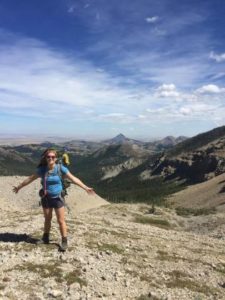 Practicing mindfulness can be difficult—and sometimes nearly impossible—in day- to-day life. Forty hour work weeks, stacks of schoolwork and social media are just a few of the distractions that keep us from being fully present. I often find myself battling between keeping up with the speed of society and taking time to absorb the world around me. While being mindful can be challenging, there are ways that I can achieve it. Being in the back-country is where I find myself fully present, and after spending eight days in the Scapegoat Wilderness, I was able to reflect on the things that make it easier to be present in the back-country than in everyday life.
Practicing mindfulness can be difficult—and sometimes nearly impossible—in day- to-day life. Forty hour work weeks, stacks of schoolwork and social media are just a few of the distractions that keep us from being fully present. I often find myself battling between keeping up with the speed of society and taking time to absorb the world around me. While being mindful can be challenging, there are ways that I can achieve it. Being in the back-country is where I find myself fully present, and after spending eight days in the Scapegoat Wilderness, I was able to reflect on the things that make it easier to be present in the back-country than in everyday life.
There are many aspects of backpacking that allow me to be more mindful, the first being the opportunity for solitude. The vast expanse of land that the back-country offers makes it easy to find time to be with myself, time that is necessary for personal reflection. With personal reflection I am able to take note of my needs, wants, temperament, emotions, physical well-being, and spiritual state. It is important to take time for inward reflection in order to be fully aware and present. While it is possible to find such time in everyday life, it does require a bit of effort, which ultimately takes away from living in the present. In the back-country finding solitude is quite effortless, allowing mindfulness to take its rightful place within my life.
Another aspect of back-country life–which fosters mindfulness–is exposure to the elements. Being outside 24/7 not only forces me to deal with the changing weather, but it also requires that I pay more attention to what is going on around me. On our third night in the Scapegoat, a lightning storm rolled in as we were preparing to start our lesson on Blackfeet culture. Needless to say, our lesson did not pan-out as it was intended to; our first priority was putting on our rain gear and finding a safe place to assume lightning position. We put on our rain jackets & pants, numbered off, and dispersed ourselves among the trees. As we crouched down and waited for the storm to pass, we began our lesson. The rain maintained a steady pour, the thunder boomed on, and the lighting illuminated the darkened sky as our instructor yelled out our lesson. This was not what I was expecting class to be like on this night, but it was beautiful and enriching in its own way.
As I experienced on the third night in the Scapegoat, each day brings a new set of systems, which have the potential of changing by the hour, or even by the minute. There is no way of knowing exactly what is to come, and no true escape from any harsh conditions that I may be faced with. While this is challenging, it ultimately forces me to be fully aware of the present conditions in order to be prepared for what I am faced with. Beyond that, enduring the elements allows me to appreciate varying conditions for what they are: intense sunlight warms the soul, rain storms quench the earth & awaken the senses, bitter cold reminds me that I am truly living. Often times I find myself most absorbed in the present moment in times of fear, hardship, or even discomfort.
Perhaps one of the most obvious ways that back-country living enforces mindfulness is through minimalism. When backpacking, there is no desire for luxury items; since all of my possessions must fit in my pack, there is only room for items that are truly necessary. Anything extra turns out to be a hassle, and unnecessary items left at home are never deeply missed. By cutting down on material possessions, I am able to spend less time worrying about silly things like what I should wear, bring, or use. Through this process, I am able to focus on what is happening in the present moment. Less time with material objects means more time to engage with the people and places that I am currently in.
So backpacking allows me to be more mindful, but why is this so important? Mindfulness equates to happiness in that it forces acceptance of conditions that are out of my control. Learning to enjoy “the now” is the only form of truly living. This may seem like a bold statement, but take a second—or two, maybe three—to think about it. Why trap yourself in the hells of dwelling on the past or being anxious about the future when you could simply be enjoying the present moment for what it has to offer? The next time that you find yourself worried or stressed, I challenge you to find the things that allow you to be mindful, to be present. Slow down, take a walk, breath fresh air, and focus on living in the moment. Choose happiness; choose life.